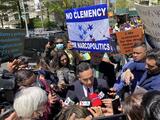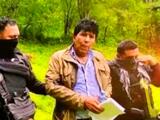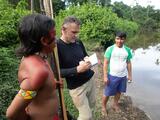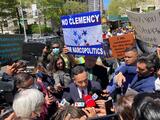ANALYSIS: “State-sponsored drug trafficking”; the case against Juan Orlando Hernández

Seated at a table in a home in western Honduras, Joaquín ‘El Chapo’ Guzmán, the notorious former leader of the Sinaloa Cartel, allegedly asked Juan Antonio ‘Tony’ Hernández for his phone number, then instructed one of his employees to retrieve $1 million in cash from a car outside.
Bundles of bills wrapped in plastic and worth $50,000 to $100,000 each were then placed on the table.
“Tony Hernández told Chapo that money was for Juan Orlando Hernández's campaign,” said Alexander Ardón, recalling the 2013 encounter at his home while testifying in a New York courthouse against Tony Hernández – his former drug trafficking associate – in October 2019.
Between approximately 2005 and 2017, the former president of Honduras allegedly received millions of dollars in illicit campaign financing – “bribes” according to prosecutors – from a who’s who of Mexican and Honduran drug traffickers.
Hernández has denied the allegations, calling them lies made up by violent criminals who are attempting to reduce their own sentences.
On Monday, Univision confirmed that Hernández had been indicted for drug trafficking and related weapons charges by U.S. prosecutors and a request for his extradition sent to the Honduran government.
Honduran security forces surrounded Hernández’s home in Tegucigalpa late Monday to avoid any attempt to escape and await a potential arrest warrant from the Supreme Court, which is scheduled to meet this morning to discuss the matter following the receipt of the extradition request.
If Hernández is extradited, the accusations of bribes - and the protection from law enforcement that the president allegedly provided in return - could finally be put to the test in front of a jury.
Prosecutors have called it “state-sponsored drug trafficking”, accusing Hernández of turning Honduras into a virtual ‘narco state’. According to the extradition request sent to Honduras, viewed by Univision, Hernandez was part of “a violent drug-trafficking conspiracy” that trafficked roughly 500,000 kilos of cocaine through Honduras to the United States.
The evidence presented in previous trials and court filings suggests that in the event of a trial, the witness list could be long and the accusations hard to overcome.
“There's more than enough evidence to indict - and convict - him,” said former DEA chief of operations, Mike Vigil. “The DEA doesn't do things lightly because U.S. prosecutors are among the most conservative in the world. They will not take a case unless it's totally airtight and winnable,” he added.
'El Chapo' & Co.
The meeting at Ardón’s house in 2013 was also attended by a number of other individuals, including a brother of Ardon, Hugo Ardon, and Mauricio Hernández Pineda, a former cop and cousin of Hernández. Hernández Pineda turned himself in a year ago and is currently negotiating a plea agreement with prosecutors – potentially a major blow for the former president given the family ties.
Although Juan Orlando Hernández wasn’t present at the meeting, his brother was allegedly acting on his behalf and the money was for his campaign. If Hernández Pineda strikes an agreement with prosecutors, then he could be called to corroborate Ardon’s testimony and potentially testify about how – and to who – the money was ultimately delivered.
That meeting was the second that was held between El Chapo and Tony Hernández that year, with the first held at the ranch of the drug traffickers Miguel Arnulfo and Luis Valle Valle – who before their capture in 2015 were arguably the most powerful narcos in Honduras. During that meeting, El Chapo and Tony Hernández allegedly discussed protection for drug shipments that the latter said could be provided if his brother wins the election.
Ardón and Hernández Pineda were present at both meetings, as was Hugo Ardon, who Univision has learned exclusively is in U.S. custody, is cooperating with prosecutors and could be called to testify. The Valle Valle brothers are also cooperating with prosecutors and could be called to corroborate the facts regarding the meeting at their home.
According to the extradition request, Hernandez met with his brother Tony Hernandez, Ardon and his brother Hugo Ardon, to discuss the extradition of the Valle Valle brothers, after their capture in October 2015. Hernandez said at the meeting that he had decided to extradite the brothers because they had plotted to assassinate him, but that he would continue protecting “his drug trafficking allies.”
Another potential witness is César Gastelum Serrano, the Sinaloa Cartel’s point man in Honduras. Gastelum Serrano was arrested in Mexico in 2015 and later extradited to the United States. He is now cooperating with authorities. He was not present at the now infamous meetings with El Chapo in Honduras, but he might have knowledge of them that further corroborates other witness testimony.
Furthermore, there are likely few people who know more about the dynamics of drug trafficking in Honduras and the actors involved. According to a court filing in the case of another Honduran narco, he made two additional payments of $500,000 each to Hernández’s campaign.

Millions more
As Hernández rose up the political ladder, the alleged bribes from drug traffickers got bigger and bigger. In 2005, when he ran for his third term in Congress, a narco who operated in his hometown of Gracias, Lempira, Victor Hugo “El Rojo” Diaz Morales allegedly gave Tony Hernández $40,000 for his brother’s campaign. Four years later, he said he gave Tony Hernández $100,000 for the campaigns of his brother and Pepe Lobo, who was elected president that year. Diaz Morales is cooperating with prosecutors.
That same year, Ardón testified that he contributed $2 million to the campaigns of Lobo and Hernández. Then, when Hernández needed help convincing other legislators to vote for him for president of Congress, Ardón said he bribed three legislators from his home department of Copan.
Around 2013, as Hernández ran for president of the republic, he allegedly received payments from even more narcos. Ardón said he contributed roughly $1.6 million to his campaign in Copan. One of the leaders of the Cachiros drug clan, Devis Leonel Rivera Maradiaga, has testified that he gave $250,000 to Hernández through his sister, Hilda. Carlos ‘El Negro’ Lobo, who operated along the north coast, allegedly paid $250,000. Rivera Maradiaga and ‘El Negro’ Lobo are both cooperating with prosecutors.
During the campaign Hernández also allegedly met with the trafficker Geovanny Fuentes, who delivered a bribe of $25,000 as well as giving something of much more value – access to his cocaine laboratory that was strategically located near an important port. Fuentes was convicted of drug trafficking and related weapons charges last year.
During his trial, an accountant who worked at the business where the meetings were held testified that he witnessed the payments and overheard conversations, including Fuentes and Hernández allegedly plotting to “shove the drugs right up the noses of the gringos.” The accountant – whose testimony was particularly powerful given that he is not a criminal – would likely be called to take the stand against Hernández.
In 2017, as Hernández ran for a controversial reelection despite a constitutional prohibition against it.
Ardón allegedly contributed roughly $1.5 million to his campaign and “to bribe other politicians and election officials to support Hernandez.” The scheme allegedly also included Hugo Ardon, who according to the extradition request, “traveled to various municipalities that were not sufficiently supporting Hernandez, and bribed officials who controlled voting centers to manipulate the vote count in Hernandez’s favor.”
Drug ledgers
In June 2019, the drug trafficker Nery Lopez Sanabria was captured in western Honduras. Inside hidden compartments, anti-narcotics agents found weapons, cash and drug ledgers stuffed inside a backpack. Upon reviewing the drug ledgers, agents were shocked to find the name of Tony Hernández spelled out in full and the initials of Juan Orlando Hernández, JOH, which he is commonly known by in Honduras. The person listed as JOH in the ledgers received payments ranging from $50,000 to $135,000.
The ledgers were presented during the October 2019 trial of Tony Hernández through the testimony of one of the agents that discovered them and served as key evidence to corroborate the testimony of witnesses. They were so damaging to his case, that a brother of Tony and Juan Orlando visited Lopez Sanabria in prison before the trial to attempt to convince him to testify that the ledgers were false, or that the names and initials referred to someone else, Univision revealed in 2019.
Less than a month after the trial, Lopez Sanabria was savagely murdered inside the maximum-security prison he was being held in. Univision later reported that he had attempted to negotiate a cooperation agreement with the DEA through his lawyer.
Lopez Sanabria is listed as “CC-2”, or co-conspirator 2, in the extradition request, which states that he was murdered to prevent his “potential cooperation against, among others, Hernandez.”
Secret recordings
Key to the prosecution of Honduran drug traffickers have been numerous video and audio recordings taken by undercover agents and cooperating informants, such as the former leader of the Cachiros, Devis Rivera. In one of the recordings, Yankel Rosenthal, who worked in Hernández’s 2013 campaign and was later appointed to his cabinet, confirmed to Carlos ‘El Negro’ Lobo that he delivered his bribe to Hernández.
“Actually, I didn’t tell him on your behalf, I told him on behalf of the … the, about some, some friends and he understood, right?” Rosenthal said to Lobo, according to a transcript of the conversation. Contemporaneous statements such as these could help corroborate some of the testimony of cooperating witnesses.
Furthermore, there’s little doubt that there are more secret recordings that have not yet been revealed, or in some cases, whose entire contents have not yet been made public.
Hernández’s defense
Ever since he was named a co-conspirator in his brother Tony’s case, Hernández has been previewing and perfecting a line of defense that could be employed in court. His primary response to the accusations has been to attack the credibility of the cooperating witnesses, bringing attention to their violent, criminal backgrounds and the fact that they are testifying in order to reduce their sentences.
Hernández has focused in particular on Devis Rivera, who also happens to be the prosecution’s star witness and the person who more than anyone else has helped U.S. authorities dismantle the once-untouchable drug trafficking networks in Honduras. The Cachiros have confessed to participating in the murders of at least 78 people, a gruesome fact that Hernández and others have used to attempt to discredit them.
“If it's simply one individual’s statements, an effective way to cross-examine that individual is to show that there is no other proof other than that person's word that in fact the bribe took place,” said David Weinstein, former chief prosecutor of the narcotics unit for the Southern District of Florida.
Vigil and others pointed out that, while shocking to some, federal drug cases often involve witnesses who are themselves criminals with cocaine - or blood - on their hands. Several traffickers confessed to scores of drug killings testified - to devastating effect - in the 2019 trial of Tony Hernandez. “If they all say the same thing, and corroborate the evidence, that can be very effective testimony,” said Vigil.
Five confessed drug traffickers testified against Tony Hernandez. If Juan Orlando Hernandez were to stand trial, prosecutors could place all their cards on the table and potentially present even more cooperating witnesses than they did against his brother.
Extraditions
Hernández has also cited his record as evidence of his innocence. In January 2012, he helped push through Congress a constitutional reform that paved the way for Honduran traffickers to be extradited to the United States. “A person who has colluded with drug traffickers would never approve extradition,” he said in a February 2021 address to Congress.
Prosecutors suggest, however, that Hernández believed he could control who was extradited, protecting those closest to him and his brother. Notably, none of the traffickers who testified against Tony Hernández were extradited from Honduras. Furthermore, after the Valle Valle brothers were arrested in Honduras in 2015, Univision has learned that there was an attempt by the Honduran government to stop all extraditions, which was thwarted by intense pressure from the United States.
Hernández came under investigation for his involvement in drug trafficking by the U.S. Drug Enforcement Administration (DEA) around 2013. Nevertheless, the U.S. government continued to praise him publicly for his administration’s cooperation on matters such as extradition. That apparent contradiction has often been raised by Hernández, but there is a long history of the DEA building a case against a target while publicly maintaining appearances. Such was the case of former Panamanian leader Manuel Noriega, who was once considered an ally of the DEA but then was later convicted of drug trafficking.
In court documents, prosecutors said Juan Orlando Hernández allegedly told one convicted trafficker that “he wanted to make the U.S. Drug Enforcement Administration think that Honduras was fighting drug trafficking.”
“All a lie”
Last spring, Hernández debuted a new defense based on the DEA’s secret recordings. "These recordings show that the drug traffickers' current testimony is a lie,” said Hernández in a March 2021 speech. “Today they claim that in 2013 they had made a deal with me, that they had bought impunity, but their own conversations in 2013, their own words, spoken in private among themselves, show that none of that is true. It is all a lie that they are … telling the court, and hoping that the magic key will save them."
Hernández noted that the drug traffickers who appear in one of the recordings said that he was “skittish.” He went on: “In other words, that I’m not a person with whom they can make deals and they feel frustrated because of that,” said Hernández.
But there’s another potential interpretation. By then, Hernández knew that the DEA was ramping up its investigations of drug trafficking in Honduras, including by forming a new Special Investigative Unit, or SIU.
“When you shoot a king...”
In the end, the government’s case would depend less upon the individual pieces of evidence it presents than the case taken as a whole. “In a general drug trafficking conspiracy, [the jury] doesn't have to be convinced of every specific allegation that took place,” said Weinstein. “Just proving that the general conspiracy took place and that that person knowingly, intelligently took part in that conspiracy and was not willfully blind to what was going on is sufficient.”
Federal prosecutors have a 99.6 percent conviction rate. Presenting charges against a former head of state requires extra caution and approval from the very top of the Department of Justice. “The Attorney General is very careful,” said Dick Gregorie, a former prosecutor who in 1988 indicted Noriega. “I’m sure he’s aware of the potential fall-out of this. When you shoot a king, you better have a big bullet. … They must think they have a big bullet.”




